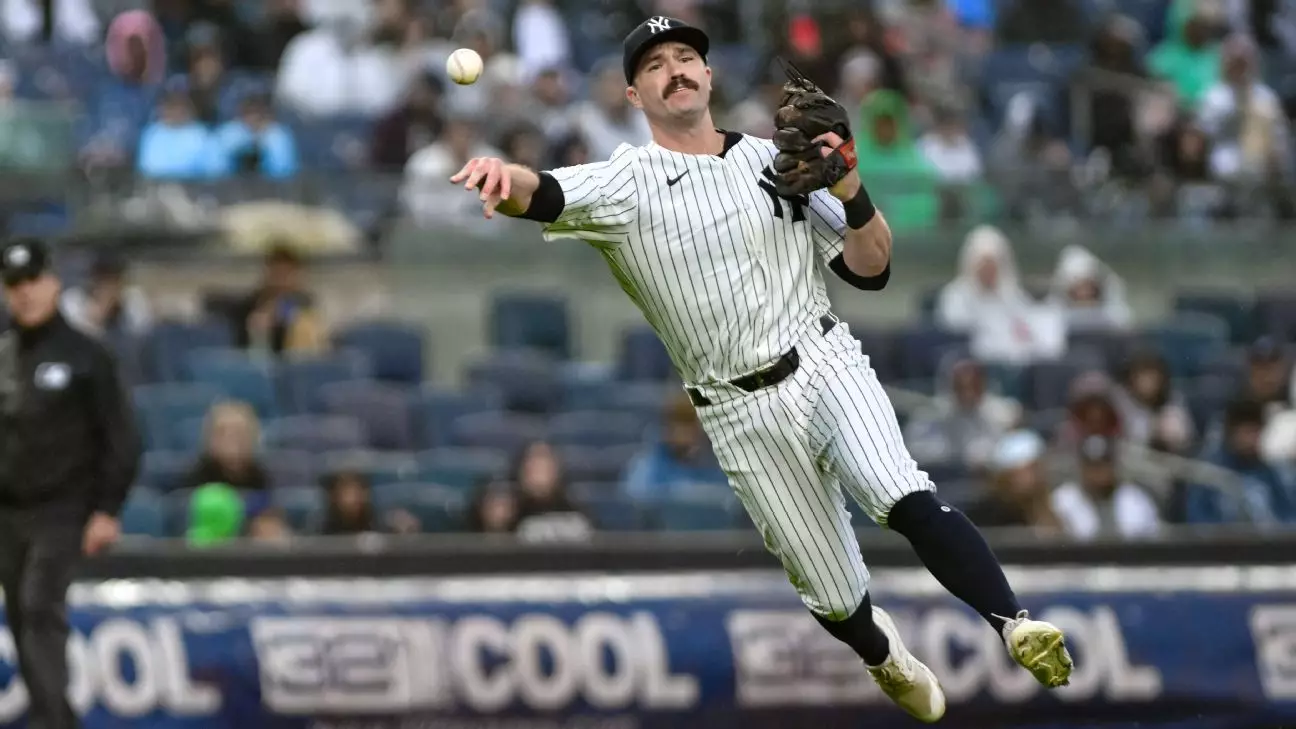The New York Yankees are no strangers to overcoming adversity, but recent injuries have tested their depth and strategy like never before. With star first baseman Anthony Rizzo sidelined due to fractured fingers, the team was compelled to tap into its backup roster for a critical matchup in the AL Division Series against the Kansas City Royals. In a decision that drew attention, Yankees manager Aaron Boone assigned Jon Berti to start at first base, marking Berti’s professional debut at this position. This article delves into the implications of this decision, alongside the Yankees’ rotation choices, and the strategic mindset behind these crucial moves.
Jon Berti’s transition to first base is emblematic of the challenges faced by teams in the postseason. Originally acquired from the Miami Marlins, Berti has showcased his versatility by playing multiple positions throughout the year. Despite his limited experience at first base, having only participated in a three-inning stint during spring training, Boone has expressed confidence in Berti’s abilities. His .273 batting average in a limited number of games for the Yankees further supports the rationale behind this decision. Berti’s natural infield skills were recognized as a crucial factor in adapting to the demanding environment of the playoffs.
The decision to place Berti at first base instead of opting for a more seasoned player reflects the Yankees’ strategy of leveraging player adaptability. Manager Boone acknowledged that the loss of Rizzo left them in a “less than ideal” situation, yet he emphasized the need for flexibility. This mindset is pivotal in high-stakes games where lineup consistency can often be sacrificed for optimal matchups against opposing pitchers.
In Game 1, Oswaldo Cabrera filled the first base position and demonstrated his skills with a solid performance, despite a rough day at bat. He struck out three times but managed to contribute defensively. On the other hand, rookie Ben Rice, who had experience filling in for Rizzo earlier in the season, also remained a potential option on the roster. The decision to rotate different players can foster a competitive atmosphere but also risks disrupting team chemistry. Assessing who performs best under pressure is key to navigating this high-stakes environment.
This scenario highlights an essential factor in postseason play: the reliance on player depth. While the Yankees typically have a robust roster, injuries can unearth vulnerabilities. The Yankees’ decision not to stick to a single player for the first base role but to strategically rotate between Berti, Cabrera, and Rice exemplifies an adaptive strategy aimed at maximizing the strengths of their available players.
Alongside the infield changes, Boone’s selection of Clarke Schmidt as the starter for Game 3 against the Royals was another significant strategic move. Schmidt, a right-hander with experience, brings a certain reliability to a rotation that already includes ace Gerrit Cole and fellow pitcher Carlos Rodón. His performance during the regular season, with a 2.85 ERA across 16 starts, positions him as a solid choice to handle the pressure of the postseason.
However, the decision to bypass Luis Gil, a promising rookie in his own right, could raise eyebrows among fans. While Gil has displayed significant potential, evidenced by his impressive strikeout capabilities, he is also plagued by inconsistency, underscored by leading the majors in walks. This choice speaks to a broader lesson in playoff preparation: Experience often trumps potential during high-pressure moments. Schmidt’s past performances and familiarity with the team’s strategies could provide the stability needed in a pivotal game.
The injury challenges faced by the New York Yankees could have spelled disaster for the team’s postseason ambitions, but the adaptations they’ve made are indicative of a resilient and strategic organization. The decisions to play Jon Berti at first base and Clarke Schmidt on the mound reflect an overarching philosophy rooted in flexibility and calculated risk-taking.
As the Yankees navigate the complexities of playoff baseball, their ability to improvise while maintaining player confidence will be crucial. The outcome of this series will not only depend on individual performances but also on the adequacy of these strategic decisions in the face of uncertainty. The spirit of adaptability will undoubtedly be tested as they seek to advance deeper into the playoffs and contend for a championship, making every play—whether by seasoned stars or rookies—pivotal in their journey.


Leave a Reply